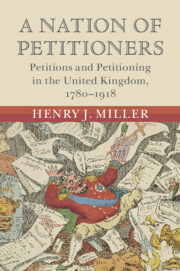‘… an important study of a relatively neglected area of British politics: petitions. … Recommended.’
P. Stansky
Source: Choice
‘[A] richly researched and lively study … the product of a decade of archival work, the arguments of the books are supported by an impressive wealth of statistical material combining insights from across political, cultural, and economic history. Moreover, the case studies selected for discussion provide a genuinely innovatory addition to the analysis of constitutional discourse during the long nineteenth-century … Miller’s attempt to reclaim and re-examine the tradition of petitioning in the British political system is an impressive achievement.'
Antony Taylor
Source: Cultural and Social History
‘… provides a valuable and substantial treatment of petitions … It brings out effectively the sheer scale of petitioning as an activity, and the energy and organization that underpinned this. By situating this topic comparatively and chronologically, it conveys the remarkable extent of petitioning in these years, confirming the centrality of parliament to UK political culture … it can be read as a restatement of the distinctiveness and coherence of the nineteenth century as a period in UK political history … the significance of petitions and petitioning to UK political culture emerges clearly from this rich and important account which will be of interest to students if subscriptional cultures in general as well as to historians of the nineteenth century.’
James Thompson
Source: Journal of Modern History
‘Miller reveals not just the vitality of political life but of the field of study itself. [This book] will be a must-read cornerstone of the long overdue nineteenth-century political history revival.’
Naomi Lloyd-Jones
Source: Journal of British Studies
‘The volume is convincing as an innovative contribution to the discussion of the political public sphere in Great Britain and points out that a broader concept of institutions, politics does not dichotomously fall into the areas of the constitution and the public sphere, and opens up a profitable perspective.’
Torsten Riotte
Source: Historische Zeitschrift
‘[A] very important book which will have a major impact on scholarly understandings of British political culture. … As he demonstrates, one did not need to be a politician, powerbroker or even a voter to engage with the British state and potentially influence national affairs.’
Brodie Waddell
Source: Family & Community History
‘The great merit of Henry J. Miller’s new book - the result of many years of detailed exploration of this important but hitherto neglected source of ‘public opinion’ - is in providing a longitudinal study of the importance of petitioning within the United Kingdom between 1780 and 1918, and in setting these developments in their wider, pan-European, context. … a monograph which combines forensic research evidence with admirable clarity and lucidity. The book is undoubtedly one of the more important interventions in nineteenth-century British political history to have been published in recent years.’
Richard A. Gaunt
Source: The Scottish Historical Review
‘Miller’s comprehensive book makes a powerful and well-supported case … to the extent that no undergraduate essay on nineteenth-century British popular politics will henceforth be complete without a paragraph on petitions. It is a hugely impressive scholarly achievement. … Miller’s scholarship is in most respects so all-encompassing that it is hard to imagine how more research could change the shape of his overall narrative … [a] fine, pioneering book … a triumph, and one which forces us to conceptualise popular politics in a genuinely new way. Miller deserves many plaudits.’
Alex Middleton
Source: The English Historical Review
‘This massively researched anatomy of petitions during Britain’s “long” nineteenth century is an impressive and important feat of scholarship, for it substantially alters our understanding of British political culture and the historical development of the British state in this pivotal era. … it seems no big stretch to say, thanks to Miller’s book, that petitioning was the true vernacular language of politics during this democratizing era. … he richly contextualizes these findings by connecting them with an immense range of archival collections and contemporary printed sources. This is a formidable research achievement, and Miller makes the most of it by deftly putting that research into conversation with an enormous secondary literature … As lively and engaging as it is erudite, Miller’s book should quickly emerge as a foundational text. For it accomplishes the remarkable feat of fundamentally reshaping our understanding of a Victorian political nation we long since thought we thoroughly understood.’
Philip Harling
Source: The American Historical Review


